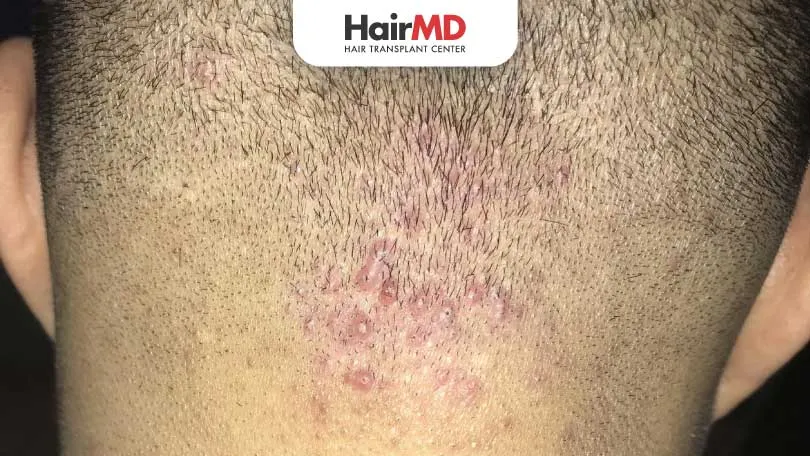
As the name suggests, folliculitis features the inflammation of hair follicles. One of the most common causes of folliculitis is a bacterial infection. Of course, the bump or pimple at the base of scalp hair could be itchy and painful. But even worse, the bump can rupture to become a crusty sore.
Now, mild folliculitis often heals without scarring on some days with self-hygiene. But repeated or serious instances would require clinical intervention. Ignoring folliculitis can lead to permanent hair loss and scarring. So, how do you treat folliculitis on the scalp or other body parts? Let’s look at the answer.
What’s covered in the article?
- Types of Folliculitis
- What Triggers Scalp Folliculitis
- Treatment for Folliculitis
- Home-Based Folliculitis Treatment
- Clinical Treatment for Folliculitis
- Conclusion
Types of Folliculitis
There are two types of folliculitis – superficial and deep. While the superficial type involves part of the follicle, and the deep one involves the complete follicle. The latter is more severe. Let’s look at the most common types of folliculitis.
Hot Tub Rash:
This rash involves round and itchy bumps that surface one to two days after exposure to the bacteria that causes it. It is caused by pseudomonas bacteria, commonly found in water slides, hot tubs, and heated pools, where the chlorine and pH levels might not always be maintained.
Bacterial Folliculitis:
This is another common type of folliculitis. It features a rash of itchy and pus-filled bumps. Bacterial folliculitis results from hair follicle infection with bacteria, generally Staphylococcus aureus (staph) that thrives on the skin. It can cause folliculitis by entering the scalp through a wound, scratch or cut.
Boils and Carbuncles:
This is a deep infection of the staph bacteria. In this case, boils on the scalp or other body parts appear suddenly as a painful and inflamed bump. A carbuncle is a cluster of boils.
Razor Bumps:
Clinically called pseudofolliculitis barbae, this rash might look like folliculitis. But it is the result of ingrown hair and not infected follicles. Razor bumps predominantly affect people with curly hair, who shave too close and appear mostly on the neck and face.
Many patients discuss boils on the head and scalp and scalp folliculitis treatment. So, let’s look at some factors associated with both these aspects.
What Triggers Scalp Folliculitis?
Folliculitis on the scalp is triggered by micro-organisms like bacteria (Cutibacterium, Staphylococcus aureus), yeast (Malassezia), and mites (Demodex Folliculorum). But what leads to the growth of such micro-organisms? Let’s overview some reasons.
- Using public swimming pools
- Hair follicle blockage with hair products
- Sharing razors with another person
IWeak Immunity-w - Cuts or wounds on the scalp that remain open can form the onset of infection
Some symptoms of boils on the scalp include large red pimples with surrounding crust, itchiness, and the uncontrollable feeling of scratching the head and pain.
Treatment for Folliculitis
Patients often ask us what is the fastest way to heal folliculitis . Every treatment requires time to show effect. Hence, patience and persistence matter. Nevertheless, here are some home-based and clinical treatment options to treat folliculitis.
Note: You must consult a dermatologist before trying any of the following treatment options to avoid side effects or complications.
Home-Based Folliculitis Treatment
Soap Wash:
Clean the affected area with warm water and soap twice daily for body hairs and daily shampoo for scalp hairs. Dry it with a clean towel. Wash the towel with detergent and hot water. Avoid sharing the towel with anyone.
Clinical Treatment for Folliculitis
Antibiotics:
Dermatologist may prescribe appropriate oral and topical antibiotic depending upon the severity, the organisms and the duration and recurrence of folliculitis
Laser Hair Removal:
If home remedies don’t work, the dermatologist may suggest laser hair removal as an alternative for pseudo folliculitis barbae on beard, nape of neck or body hairs. But this treatment may require the patient to visit the clinic multiple times.
Minor Operation:
A large boil or carbuncle may require making a tiny cut to drain the pus. It can help reduce pain, remove the pus with bacteria and foster quicker recovery while also lowering the risk of scarring. The dermatologist may then cover the affected area with a sterile gauze to absorb leaking pus if any.
Do You Know?
Nearly 250 Patients Visit HairMD
Everyday For Various Hair Concerns?
(Your journey to healthier and fuller hair starts here!)
Meet Our Dermatologists
Conclusion
In conclusion, treating folliculitis effectively involves maintaining good hygiene, using topical or oral medications, and addressing the root cause of the inflammation. While mild cases can heal with home remedies, severe or persistent folliculitis may require professional intervention. Early treatment can prevent the condition from worsening and help speed up recovery. By following a dermatologist’s advice and using appropriate treatments, you can promote faster healing and prevent future flare-ups, ensuring healthy skin and hair follicles.
Further Reading
Top Hair Growth Treatments for Women: Your Ultimate Guide
Find effective hair regrowth treatments for women. Explore solutions like PRP, medications, and more to combat hair loss with expert advice from HairMD.
Relation Between Masturbation and Hair Loss
Is there a relation between masturbation & hair loss? Uncover truth with our detailed analysis, separating fact from fiction to provide clarity on this common concern.
Biotin for Hair: Effective or Overrated? | HairMD Pune
Biotin is popular for hair growth, but does it really work? Find out what HairMD Pune experts reveal about its benefits and limitations.
Is Male Pattern Baldness Dominant or Recessive?
Male pattern baldness is not simply dominant or recessive. Learn the genetics, myths, and treatments available at HairMD Pune.
Have thoughts? Please let us know
We are committed not only to treating you, but also educating you.










